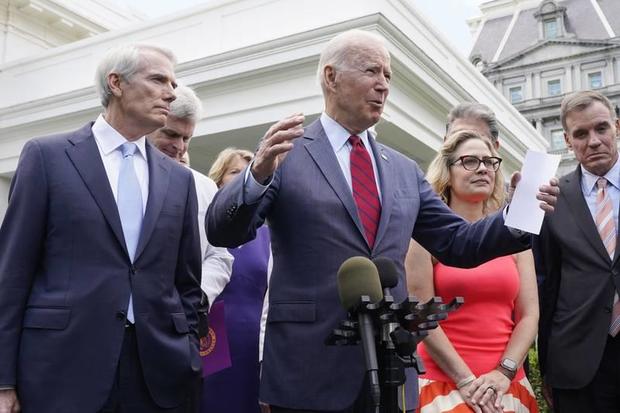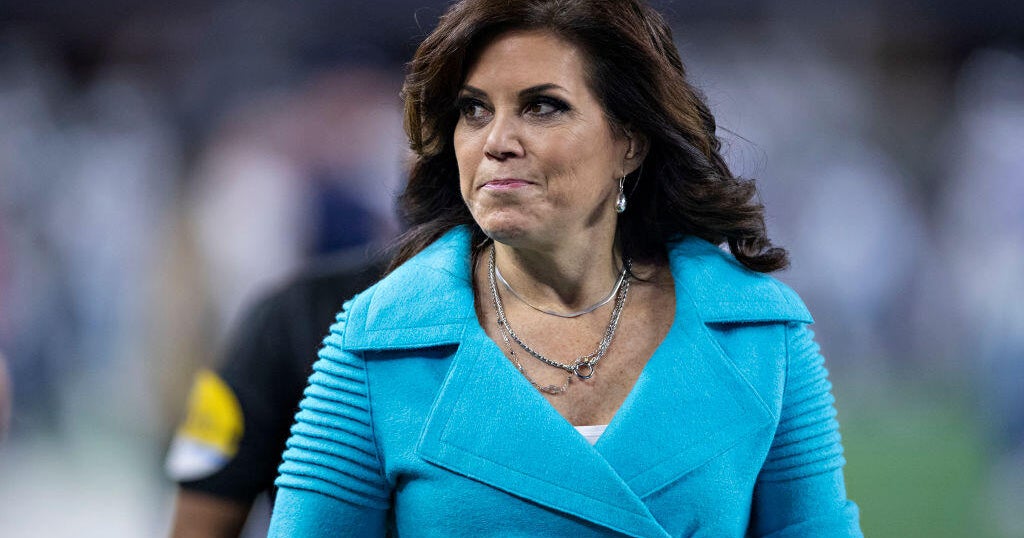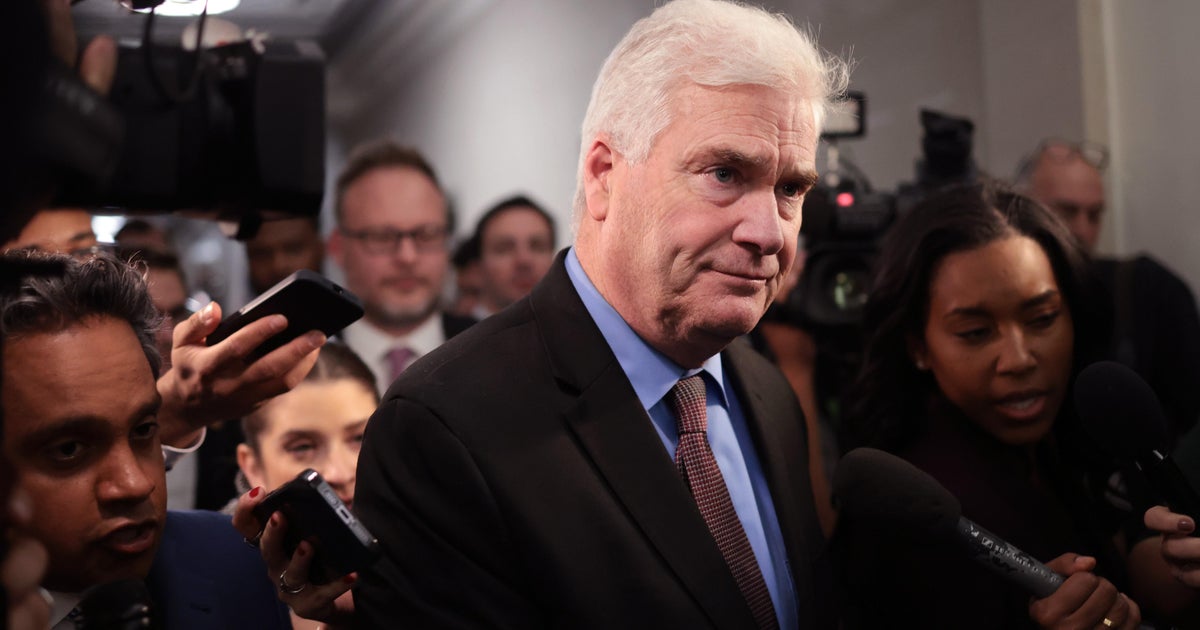"We have a deal": Biden announces bipartisan compromise on infrastructure
Washington — President Biden threw his support behind an infrastructure proposal negotiated by a bipartisan group of senators, boosting momentum for the deal even as Democratic congressional leaders also press ahead with a larger bill addressing the more ambitious aspects of the president's agenda.
"We have a deal," Mr. Biden told reporters outside the White House after a meeting with the 11 senators who had negotiated the package. "We made serious compromises on both ends."
Mr. Biden, who spent nearly 40 years in the Senate before becoming vice president, has positioned himself as a dealmaker who is able to work with both sides of the aisle. But this proposal may have a rocky path to passage, because Congress will simultaneously be crafting a larger bill to include provisions related to climate change, child care, health care and education. Several progressives in both houses of Congress had said they would not support a bipartisan deal without it being accompanied with a larger bill.
Mr. Biden told reporters later on Thursday that Congress would move forward with the bipartisan bill "swiftly and in tandem" with a reconciliation bill that will include his priorities on "human" infrastructure, such as child care and health care. A reconciliation bill only needs a simple majority to pass, meaning that it can be approved without any Republican support, although with the 50-50 split in the Senate, all of the Senate Democrats would have to agree to it.
"We have to move and we have to move fast, and this agreement signals to the world that we can function, deliver and do significant things," Mr. Biden said. "I'm not going to rest until both get to my desk."
He said he wouldn't sign the bipartisan bill unless the larger reconciliation bill also passes.
"If this is the only one that comes to me, I'm not signing it," Mr. Biden said.
Some Republicans complained that Mr. Biden's insistence on supporting a reconciliation bill undermined his commitment to the bipartisan bill. Senate Minority Leader Mitch McConnell on Thursday condemned the president for taking "the extraordinary step of threatening to veto" the bipartisan deal, and GOP Senator Lindsey Graham on Friday tweeted "No deal by extortion!"
However, Mr. Biden had signaled from the beginning of negotiations that he believed a reconciliation bill was necessary to address his priorities not covered in a bipartisan proposal, with the White House calling it a "two track" process. This was also expected by McConnell, who said earlier in June that "we are anticipating at some point getting a reconciliation bill." Standing firm on a reconciliation bill is also necessary for Mr. Biden to garner sufficient support from Democrats for the bipartisan deal.
The bipartisan proposal unveiled on Thursday would cost roughly $1 trillion, with $579 billion in new spending. The group of 21 senators initially agreed on a proposal last week but still differ on how to pay for the measure. By Wednesday, they reached an agreement on a "framework," that included funding, and presented it to Mr. Biden on Thursday.
"We didn't get everything we wanted, but we came up with a good compromise that's going to help the American people," GOP Senator Rob Portman told reporters after the meeting with Mr. Biden.
Democratic Senator Kyrsten Sinema said the deal "shows that when a group of people who are committed with shared values to solving the problems and challenges our country faces, we can use bipartisanship to solve these challenges."
The bill will be narrowly focused on "traditional" infrastructure, like roads, bridges, improving railways and expanding broadband. It would spend $312 billion for transportation, including $109 billion for roads, bridges and major projects, $49 billion for public transportation and $66 billion for passenger and freight rail. It also dedicates smaller amounts to safety, airports, electric buses and electric vehicle infrastructure, a priority for Mr. Biden.
The proposal also includes $65 billion for broadband infrastructure, $55 billion for water infrastructure, $73 billion for power infrastructure and $47 billion for resiliency.
A White House fact sheet said some of the funding will come from redirecting unused unemployment insurance relief funds and other unused money from the most recent coronavirus stimulus bill, which Mr. Biden had initially opposed. Other funding streams will come from allowing states to sell or purchase unused toll credits, extending expiring customs user fees, 5G auctions proceedings, the strategic petroleum reserve sale and public-private partnerships.
The fact sheet also suggested that some of the bill will pay for itself, citing "macroeconomic impact of infrastructure investment." Some funding will also come from tax gap enforcement, which Democratic Senator Mark Warner estimated would net around $100 billion in revenue.
Although 21 senators have signed onto this bipartisan measure, it will need the support of 60 senators to advance to a full vote on the Senate floor. Some Democrats said it would be inadequate if considered alone.
"Way too small. Paltry. Pathetic. It has to be combined with a second much more robust, adequate package to be deserving a vote," Democratic Senator Richard Blumenthal said.
Senator Elizabeth Warren said, "We are not leaving childcare behind, we are not leaving home health care behind, we are not leaving the green energy changes that we need to save our planet behind, and we are not going to make America's middle-class families pay for this package."
The reconciliation bill, which is being crafted by Budget Committee chair Bernie Sanders, is expected to include provisions like Medicare expansion, as well as the remainder of Mr. Biden's $1.7 trillion American Jobs Plan and his $1.8 trillion American Families Plan not covered in the bipartisan proposal. Sanders signaled that he's open to supporting the bipartisan bill but needs to see the details.
"There's no disagreement that we need money to rebuild our roads, and our bridges and water systems, wastewater plants, broadband — all of that is good," Sanders said. "Our job right now is to continue working on a major bill, which addresses the crises of working families."
Senate Majority Leader Chuck Schumer said on Thursday that the Senate will "concurrently" take up the bipartisan deal and a large budget reconciliation bill, which would only require 50 votes to move forward and he expects the first votes "when we return for the July work period," Schumer said.
"Today's action makes me more confident than ever that at the end of this process, we will see the boldest, strongest legislation that this country has seen in decades," the Senate majority leader said.
But a reconciliation bill would require all 50 Democrats to support it, and Senator Joe Manchin, one of the lead negotiators of the bipartisan deal, hasn't committed to supporting a reconciliation bill because of its hefty price tag. He told reporters that he needed to see what was in that bill first.
"We have the responsibility and obligation to make sure that all the Congress on both sides know what's in this plan. To say that one's being held hostage, that doesn't seem to be fair to me," Manchin said.
But he later acknowledged that "reconciliation is inevitable," adding that "we just don't know what size it's going to be." Initially coming in at around $6 trillion, the final number could be lower, since some of it will be included in the bipartisan deal.
And House Speaker Nancy Pelosi emphasized that there won't be a bipartisan deal without the second-track reconciliation bill.
"We will not take up a bill in the House until the Senate passes the bipartisan bill and a reconciliation bill," Pelosi said during her weekly press conference. Congresswoman Pramila Jayapal, the chair of the House Progressive Caucus, told reporters that "if we don't have what we want in the budget resolution, you're not gonna have the votes."
Earlier on Thursday, Warner addressed concerns that the deal could fall apart as Congress is under pressure to pass both a reconciliation bill and the bipartisan bill, saying that "until it's signed by the president, anything can happen." But he said the president's support provides a significant boost.
"This is a indication to the world that bipartisanship still is alive and well in the United States," Warner said.
Jack Turman contributed to this report.






